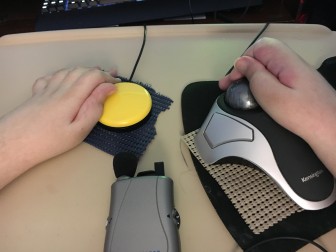Lack of Guidance Leads to Web Access Lawsuits
Almost three decades ago, the Americans with Disabilities Act required public places to accommodate people with disabilities — anything from installing ramps and elevators at schools to putting chair lifts in swimming pools. But back then, long before the Internet grew into what it is now, the law didn’t address the accessibility of websites. Now, with a proliferation of lawsuits, many companies are racing to bring their sites into compliance with industry standards.
These changes will almost certainly affect Joseph Walter. He’s a 23-year-old college student who takes classes online. He’s also confined to a special chair and a ventilator. He has limited use of two fingers and the thumb on his other hand. But his mind and his cursor are flying all over the internet, thanks to a special clicker and other modifications. I ask Joseph whether most websites are hard for him to use and his mother, Debra Walter, interprets his response:
“He doesn’t think they’re specifically accessible for him.”
And Joseph is something of a coding expert himself. He does research and shops online. And sometimes he tangles with websites that are hard for him to use, but he finds work-arounds on the fly. Many businesses are doing the same, as they scramble to make their sites compliant.
“This has gone from a requirement in a project to the most important requirement in a project, just really within the last two or three months,” says Mac Logue, creative director for Fitzmartin, a Birmingham-area marketing agency. He and other web-developers say that’s partly to avoid lawsuits as they try to make their sites accessible. How websites actually do that is evolving, and so are the industry guidelines that have become the de facto standard: the Web Content Accessibility Guidelines, or WCAG 2.0. They’re basically industry best practices to ensure everyone can use websites.
“That includes people with no or low vision, people who may not have physical access to a mouse,” Logue says. “So, to be able to operate an entire website from the keyboard, say, or even a specialized keyboard that you look at but can’t physically touch.”
A site might also have to display captions when you hover over a video. All those are just a few of the needs to address. But the big question is, what is compliance?
In 2010, the Justice Department said it would issue guidance, but that hasn’t happened. Last year, more than 800 federal lawsuits were filed targeting businesses whose websites lawyers say were not accessible to people with disabilities.
“When the ADA was enacted, they did not think about things like websites,” says Leah Dempsey, Senior Director of Advocacy and Counsel for the Credit Union National Association. Credit unions around the country have faced dozens of lawsuits in recent months.
“There’s nothing under the ADA about what is necessary, but there [are] private industry standards. And that’s why there’s so much litigation out there. There’s a legal gray area.”
She’s holding out hope for clarity from the DOJ or from the courts. In the meantime, trying to bring websites up to standard is expensive. Depending on the site, that can easily range from $10,000 to $100,000. And legal fees can add tens of thousands of dollars more. The U.S. House of Representatives recently passed a bill giving companies a grace period to make their websites accessible, but the bill’s future is uncertain.
Logue says it’s in everyone’s interest to pay attention.
“You may not be getting sued today, but almost every business is going to be at risk at some point.”
Unless clear guidelines are issued soon, industry-watchers predict more legal battles.
AI brings Supreme Court decisions to life
Like it or not, the justices are about to see AI versions of themselves, speaking words that they spoke in court but that were not heard contemporaneously by anyone except those in the courtroom.
The airspace around El Paso is open again. Why it closed is in dispute
The Federal Aviation Administration abruptly closed the airspace around El Paso, only to reopen it hours later. The bizarre episode pointed to a lack of coordination between the FAA and the Pentagon.
‘Dawson’s Creek’ star James Van Der Beek has died at 48
Van Der Beek played Dawson Leery on the hit show Dawson's Creek. He announced his colon cancer diagnosis in 2024.
A Jan. 6 rioter pardoned by Trump was convicted of sexually abusing children
A handyman from Florida who received a pardon from President Trump for storming the U.S. Capitol on Jan. 6, 2021, was convicted on state charges of child sex abuse and exposing himself to a child.
A country-pop newcomer’s debut is your reinvention album of 2026
August Ponthier's Everywhere Isn't Texas is as much a fully realized introduction as a complete revival. Its an existential debut that asks: How, exactly, does the artist fit in here?
U.S. unexpectedly adds 130,000 jobs in January after a weak 2025
U.S. employers added 130,000 jobs in January as the unemployment rate dipped to 4.3% from 4.4% in December. Annual revisions show that job growth last year was far weaker than initially reported.








